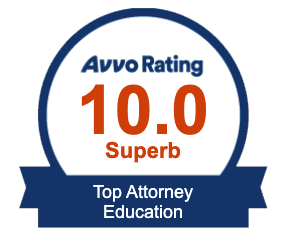It is almost mid-July and school will begin in most school systems within the next 3-4 weeks. The summer seems to pass so quickly. Teachers and administrators will actually return back to their school system by the end of July for pre-planning meetings and preparation for the upcoming school year. Do you expect the school system to develop, review, and comply with your child’s IEP for the 2015-2016 school year?
The practice of special education law is very challenging. When school is in session I received phone calls from parents asking questions about IEPs, special education eligibility, disciplinary hearings, manifestation determination meetings, placement for private school or residential facilities, due process hearings and a host of other special education topics. Most of the time I can only answer general questions for the parent. Without reviewing the child’s educational records including IEPs, eligibility reports, disciplinary reports, psychological and medical evaluations and other school documents, I cannot answer specific questions that a parent poses to me. This is not because I do not want to answer the question. I want to answer the parent’s questions and concerns but without reviewing the child’s educational records, I cannot ethically or professionally provide legal advice to address the questions and concerns. Some parents want an immediate answer to their questions. I try to explain why I cannot do that. I ask that the parents send me their child’s educational records so that I can answer, if possible, their questions and concerns. But many times I never hear back from the parent. I do not know whether they tried to contact another attorney or advocate. I do not know if they just gave up. I just wish that if parents want informed and professional answers to their specific questions that they would send me their child’s educational records. It is like asking a mechanic to fix a car without letting the mechanic see what is beneath the hood or like asking a doctor to diagnose symptoms without ever seeing the patient. You just cannot do that . . . at least I will not do that ethically or professionally. I can answer general questions such as what is the statute of limitations for filing a due process complaint or what are the legal requirements for least restrictive environment. I try to help a parent if I am able to do so. but if I cannot answer a quick general question over the phone, please send me your child’s records for review.
Most parents would be wise to bring a trained advocate or special education attorney to an IEP meeting. I do not say this to generate more clients or fees. I have almost thirty-one years experience in special education law and practice. I have attended literally 100’s of IEP meetings for parents over the course of almost 31 years. There are common things that parents encounter at IEP meetings. It is often difficult for parents to try to understand the alphabet soup, for example, that educators use during the course of the IEP meeting. What is WISC-IV, WIAT, WRAT, ITBS, STAR, Georgia Milestones, criterion referenced tests, grade equivalency scores, age equivalency scores, SDD, TBI, ABA, RIRD, ESY, executive functioning, autism spectrum disorder, ABA therapy, and the list goes on and on . . . . There have been many times that I ask IEP members to explain these type terms and phrases to the parents so they can understand what the educators are saying about their child and how they can participate meaningfully in the development and review of the IEP each year or any time during the school year. There are some parents who are quite savvy and are familiar with the special education terminology. But the majority of parents do not know the meaning of these terms. Just like I would want a doctor to explain to me what is good cholesterol counts, bad cholesterol counts, high blood pressure, low blood pressure, and the zillion other medical terms that doctors and nurses use daily, I would also hope that parents would want someone on their side during the IEP meeting to help them understand better what is going on with their child’s special education program, instruction, services, and placement. There are also many things that occur at an IEP meeting that many parents are simply unaware of. I have heard of annual IEP meetings that take 30-45 minutes. I cannot understand how that is possible. Last April and May, for instance, I had a two day IEP meeting that last 10 hours. This is to say that all IEP meetings should last 10 hours. But in most case an annual IEP meeting should take at least 3-4 hours so that you child’s educational program and IEP can meet the test that it provides a free appropriate public education. In most cases, bringing an advocate or special education attorney to an IEP meeting will save you money in the long run. If you wait too long to speak to someone who knows special education well, then sometimes your problems become more difficult and expensive to fix. It is like not going to a dentist for a long time and finding out you need a crown, fillings for cavities, and a root canal. All of this could be avoided by just a little preventive care.
Disciplinary school hearings are hard to win. Parents are given only a few days notice of the disciplinary hearing. The parent is at a severe disadvantage in that the school system knows the evidence and witnesses who will testify at the hearing. The parents do not know this information until just before the hearing. And by the time the parent receives the names of the school witnesses and other evidence that will presented at the disciplinary hearing then what is a parent to do? I receive many calls from parents during the school year from parents asking for advice and sometimes legal representation at a school disciplinary hearing for their child. Sometimes the parents will tell me that their child was caught at school with alcohol, prescription drugs that are not in a bottle, marijuana or even a weapon such as a knife or gun. In most cases, I cannot do much for the parent and child at least at the school disciplinary hearing. I can usually help if the child is charged with a delinquent offense in juvenile court. At times, I can help if the child, who is accused of a serious school offense, is a child with a disability. I can also help at a school manifestation determination meeting – in some cases – to persuade the IEP team that the child’s disability is the cause or is substantially related to the charged school offense. I will always try to be honest with the parent and tell them to save their money because there is little I can do to prevent their child from long-term suspension, expulsion, or placement in an alternative school program. I let you know if I think the school disciplinary hearing outcome is a foregone conclusion because of the school disciplinary hearing officers, substantial evidence against the child, or other factors that almost predetermine the outcome of a school disciplinary case. On the other hand, if I think that I can help the student defeat one or more school charges or reduce the disciplinary sanction that may be imposed, I will let you know.
These are just a few of my random thoughts for the day on special education cases and matters. I hope of some of these thoughts give you insight and information to process, absorb and use wisely in the future for your child.

